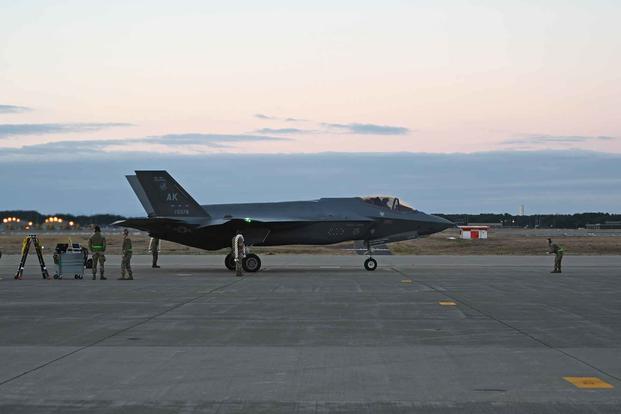
Fleets of new and updated fighter jets will be placed at U.S. military bases in Japan, a notable defense development and financial investment in the Pacific as tensions continue to rise with China.
The Department of Defense announced last week that 36 modern F-15EX aircraft will be replacing 48 older F-15C/D fighter jets at Kadena Air Base on Okinawa over the next several years. Additionally, Misawa Air Base in northern Japan will get 48 F-35A Lightning II aircraft to replace 36 F-16 Fighting Falcon fighter jets.
Pentagon officials also announced that they will “modify the number” of F-35B aircraft at Marine Corps Air Station Iwakuni near Hiroshima, but did not specify the new size of the fleet. All those changes are slated to happen over the course of several years.
Read Next: Feds Arrest Former Air Force Base Engineer in Connection to Deadly Mississippi KC-130 Crash in 2017
“The modernization plan, which will be implemented over the next several years, reflects over $10 billion of capability investments to enhance the U.S.-Japan Alliance, bolster regional deterrence, and strengthen peace and stability in the Indo-Pacific region,” the Pentagon said in a news release.
While it wasn’t immediately clear what that means for shuffling personnel, Pentagon Press Secretary Maj. Gen. Pat Ryder, in response to Military.com, said Monday that those future moves will be specific to the new aircraft.
“It’s going to be tailored to the number of aircraft, the types of aircraft and the requirements,” Ryder said. “I think it’s safe to say that the Air Force will provide whatever capabilities are needed in terms of manpower, equipment to sustain those capabilities.”
The announcement that modern aircraft will be stationed at Kadena Air Base, Misawa Air Base and Marine Corps Air Station Iwakuni came after officials announced in 2022 that F-15s would be pulled from Kadena and replaced with rotational forces of more modern aircraft.
Air Force spokeswoman Ann Stefanek told Military.com on Monday that personnel have already been relocating to the area since the F-15Cs have been pulled from Japan.
“Once new aircraft begin arriving at Kadena, associated personnel will be assigned,” Stefanek added. “This is typical during an aircraft transition. Modernizing our capabilities remains our top priority, and the transition to more capable aircraft exemplifies our continued commitment and strong foundation of [our] alliance with Japan.”
Stefanek said that, currently, rotational forces are continuing to support the base and added that “for operational security reasons” more details could not be provided.
The news of the lack of a permanent fighter squadron drew criticism from GOP lawmakers in 2022, Military.com reported at the time, because Kadena Air Base on Okinawa is one of the closest installations to Taiwan, at a little under 500 miles away.
Last week’s announcement of the modern aircraft coming to the region was well received by Japan’s government, its Chief Cabinet Secretary Yoshimasa Hayashi said at a press conference last week.
“In the face of the most severe and complex security environment since the end of World War II, and amidst the increased military activities of neighboring countries, the United States is maintaining and strengthening the presence of U.S. forces in Japan to further enhance the deterrence and response capabilities of the Japan-U.S,” Hayashi said, according to CNN.
The moves mirror the Department of the Air Force and Pentagon’s overall shift to “great power competition” — a term used by officials to justify increased spending and strategy focused on adversaries, namely China.
Last month, the 142nd Wing of the Oregon Air National Guard became the first operational unit in the entire Air Force to receive the new F-15EX Eagle II fighter jet.
— Konstantin Toropin contributed to this report.
Related: GOP Lawmakers Sound Alarm over Pulling F-15s from Japan






